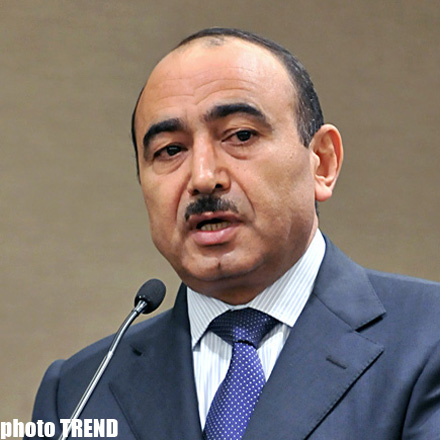Azerbaijan, Baku, June 2 / Trend /
The Head of the Department on Social and Political Issues of the Azerbaijani Presidential Administration, Ali Hasanov, gave an interview to The New York Times. Hasanov spoke about the current situation around the Nagorno-Karabakh conflict settlement.
"There is no guarantee that tomorrow or the day after tomorrow a war between Azerbaijan and Armenia won't start," Hasanov said. "It's peaceful coexistence that we need, not a war. We need peaceful development. But nothing will replace territorial integrity and the sovereignty of Azerbaijan. If necessary we are ready to give our lives for territorial integrity."
He said that Baku had been bitterly disappointed by international mediation efforts. "The United States, France and Russia do not do what they promised," he said. "America now thinks Afghanistan and Iraq are more important - and North Africa, and the missile defense shield in Europe - than such regional conflicts as Nagorno-Karabakh."
The New York Times article, which presented objective information about the Nagorno-Karabakh conflict, has caused a resonance among the Armenian nationalists, who immediately began accusing of biliousness and of every mortal sin.
"Since the early 1990s, Azerbaijan has been trying to regain control of Nagorno-Karabakh, a predominantly ethnic Armenian enclave within its borders, and secure the return of ethnic Azeris who were forced from their homes by war. A cease-fire has held since 1994, and officials remain engaged in internationally mediated negotiations with Armenia," the article reads.
"But the window for a breakthrough is narrow, and people here say their patience is gone," The New York Times writes. "One of the reasons Nagorno-Karabakh has not is that neither party has an incentive to fight."
"Armenia controls the territories, so it is interested in maintaining the status quo," the article reads. "Azerbaijan sees little way forward: though it could easily drive out Armenian forces, Russia could send its army to help Armenia, its ally in a regional defense alliance, just as it did in South Ossetia."
But conditions have been shifting, slowly but surely, in a dangerous direction, the article stressed.
"Negotiations mediated by the Organization for Security and Cooperation in Europe faltered last year, leaving a "basic principles agreement" that was five years in the making unsigned by either side," The New York Times said. "Both countries are engaged in a steep military buildup; Azerbaijan, by far the richer of the two, has increased defense spending twentyfold since 2003, according to the International Crisis Group. With frustration building, threats of war have become so entwined with negotiations that it is difficult to say where one begins and the other ends."






